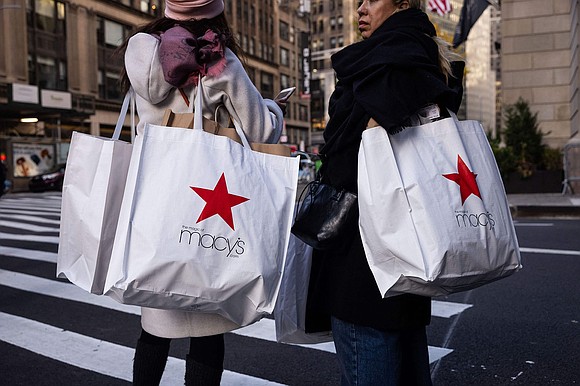Macy's Revamps to Stay Relevant in Changing Retail Landscape
The retailer is closing 150 stores
Nathaniel Meyersohn, CNN | 2/27/2024, 8:12 a.m.

Macy’s is getting a new, smaller, but more luxurious look designed to turn around the troubled retailer and keep the century-and-a-half old brand relevant to rapidly changing demands from shoppers.
First, Macy’s will have to downsize. The company is closing 150 underperforming stores — 50 by the end of 2024 and the other 100 over the next few years. By 2026, it will have just 350 Macy’s stores, the company announced.
Second, the company will focus on its successful Bloomingdale’s and Bluemercury brands — luxury stores that have outperformed the Macy’s brand. It will open more, smaller versions of those stores over the next several years.
Macy’s turnaround strategy reflects a shift in retail and US shoppers.
As the middle class has shrunk in recent decades, the retail market has split: Lower-end stores focused on cost-savings, such as Walmart, have done particularly well. But so have luxury brands, as shoppers with means have been able to keep up their spending, despite higher prices.
So Macy’s is chasing wealthier shoppers with luxury brands such as Bloomingdale’s and Bluemercury, and it’s pulling back on some of its full-scale department stores that cater primarily to more middle-class customers.
Macy’s will also build 30 smaller stores over the next two years away from malls, reflecting a trend of consumers choosing smaller stores outside of enclosed shopping malls. Smaller stores are also more profitable for Macy’s because they have fewer workers and carry less merchandise.
Battling for the future
The strategy is designed to fend off activist investors and boost the company’s moribund stock price and sales.
Macy’s and the entire department store sector have been hit on all sides in recent years. Department stores have been pressured by the rise of Amazon, the growing strength of discount chains such as TJ Maxx, and online brands.
Macy’s stock price has dropped 75% from a peak of $73 a share in 2015. Since then, it has closed nearly 300 stores — almost one third of its locations — but still operates about 700 across its brands.
Last month, Macy’s announced it was laying off about 3.5% of its workforce, or roughly 2,350 employees.
The company’s struggles have attracted the attention of activist investors. Macy’s rejected an unsolicited $6 billion bid from an activist investor to take the famed department store private last month. The activist group is taking another shot at Macy’s, launching a proxy fight to take control of the board.
Macy’s (M) stock was down slightly in premarket trading.
“We believe paring down the Macy’s store base to a more manageable (and profitable) size is prudent given the general structural shift towards online spending” and the shift away from department stores,” Dana Telsey, a retail analyst, said in a note to clients.
A new look for Macy’s
New CEO Tony Spring said in a statement that the “bold new chapter,” which has full support of the company’s board, was developed after extensive market research and will reinvigorate the Macy’s brand.
In particular, the new strategy will focus on improving Macy’s digital store and slimming down its offerings.
“We are making the necessary moves to reinvigorate relationships with our customers through improved shopping experiences, relevant assortments and compelling value,” CEO Tony Spring said in a statement.
Spring said Macy’s will improve the shopping experience for customers by focusing on brands and items that shoppers say they want. And Macy’s, a higher-end brand that has struggled as prices have surged over the past few years, said it would focus on “compelling value.”
That should lead to sustained profit growth over time, Spring predicted.
The company said that as it closes Macy’s locations, it will open new stores for its luxury brands.
Macy’s said it will open 15 new Bloomingdale’s stores and 30 new Bluemercury locations over the next three years. It also plans to remodel 30 existing Bluemercury stores.
“The Bloomingdale’s expansion can work as there are several strong luxury markets where the chain is not represented,” Neil Saunders, an analyst at GlobalData Retail, said in a note to clients.



